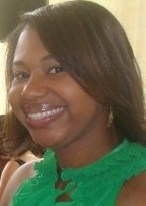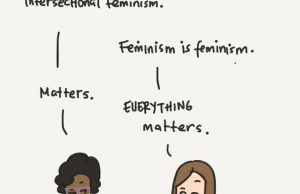Dead Center
By LeConté J. Dill
The subject of Black Academic Women’s Health beckons an autoethnographic approach:
October 2006. Excited to get new specs.
“E D F C Z P.”
“Is this one better? Or this one?… Here’s the first. And the second… Click the button when you see the faint white light….”
Didn’t expect the white light to be so faint. Didn’t expect the tech to start running around the office, looking for the doctor.
“Let’s try this again.”
Long pauses. Shuffling of papers.
“We think you may have glaucoma. You should probably follow up with a specialist. You’re pretty young, though…but then again, you are African American…”
Note to self: Forward cultural humility and health disparities literature to the optometrist’s office.
Note to self: Google glaucoma.
August 2008. Quit “good” government job. Kaiser insurance ends. Start doctoral program. Student Health Insurance Program begins.
January 4, 2010. January 18, 2010. February 1, 2010. February 15, 2010. March 1, 2010.
Repeat visits to optometrists and ophthalmologists. Techs ask me what year I’m in in undergrad. I tell them I’m pursuing my doctorate. They look puzzled. Optometry students and residents stare at my charts in the middle of the hallway. Gawk at them even.
“Is that the one you were talking about? The one with the optic nerve damage?”
The women in the waiting room, wrinkled and pale, discuss their new favorite book—The Help….then look at me. I’m 15 minutes late to class.
In the waiting room
I’m the youngest patient
Mr. Ramirez rolls his Rs
Mouths his words when he reads
March 15, 2010.
Fly home for Spring Break. Break bread with the fam, pizza dough to be exact. Thank God for the food…and for the academy. Dad reminds me that I’m the first person in the family since our ancestors were stolen from Africa to ever attempt this…this doctorate. Mom reminds me that I look pale and that my skinny jeans are a bit baggy.
March 31, 2010.
First MRI. One hour inside of a coffin-like contraption. Try to drown out the drone of the machine by humming Beyoncé and going over my three subject areas and two theoretical frameworks.
April 8, 2010.
The 129 references for my dissertation proposal weigh heavy on my back. Get a call on my cell phone from an on-campus number.
“Ms. Dill, you have a small tumor at the base of your brain…on your pituitary. You should probably follow-up with a therapist, but that’s in another office.”
You land on my front porch
Thanks to the postman
I read these funny papers
Doctor’s notes like hieroglyphics
When Black people hear “tumor,” we immediate think “The Cancer.” Not “cancer,” but “The Cancer.” Feverishly Google adenoma. Try to remember where the heck my pituitary is and what it does. I ditched my Bio and Chem books more than 12 years ago for Du Bois and Cooper and Dunham and Wilson and Anderson and Hill Collins. Immediately following the call, without skipping a beat, I dash across campus to attend a symposium, and while dashing, call my dad, who starts listing off other Bio and Chem terms, then call my mom, who chokes up at her desk at her “good” government job. Tearing up and navigating the healthcare system to find a specialist will have to wait a week—I have bigger fish to fry.
April 16, 2010.
Successfully defend my dissertation proposal. Take a power nap, and then party like a rock star. Tumor what? Tumor who?
“Thought she knew how to build resistance, make the journey to the center of the circle, stay poised and centered in the work and not fly off, stay centered in the best of her people’s traditions and not be available to madness, not become intoxicated by the heady brew of degrees and career and congratulations for nothing done, not become anesthetized by dazzling performances with somebody else’s aesthetic, not go under” (The Salt Eaters, 1981).
April 18, 2010.
Try to get my primary care physician to refer me to a specialist.
“Well, do you need a neurologist or an endocrinologist?”
“How ‘bout both?”
“Hmmm, I really don’t think it’s a big deal. You don’t really need a specialist.”
“How ‘bout I do.”
July 2010.
Finally get that referral and an approval from my insurance. Start kickin’ it with neurologists, endocrinologists, ophthalmologists, radiologists, and phlebotomists on the regular. Get blood work done like clockwork. I usually try to process and journal while I wait. Read up on research methods (others’). Read up on diseases (mine). More gawking medical residents periodically checking their smart phones. I am eventually officially diagnosed with normo-tensive glaucoma and put on meds—eye drops.
“They’ll make your lashes grow.”
I was late to class…again.
Daylight come and me wan’ go home
I want to be discharged
But the river runs red
So you pull the tourniquet tighter
October 2010.
My endocrinologist regularly yawns when she is talking to me, typing away on her laptop in the exam room.
“Have my TSH levels changed?”
“Ummm, I don’t know, let me get your chart.”
What was homegirl typing this whole time, a Facebook status update? She admits that she is stumped and orders more tests…radioactive ones this time.
“You’re not pregnant are you? Or not planning to get pregnant in the next year?”
Were those questions…or commands…or assumptions?
March 2011.
Second MRI. Dreading the bill before I even get into the coffin-like contraption. Student Health Insurance is not designed over 30-somethings or for those with chronic diseases.
I take conference calls with my committee members in hospital waiting rooms. Finish my dissertation edits in the hospital cafeteria. Homie in the garage gives me a break on the parking fee. I’m grateful for the little things.
April 2011.
I lose 10 pounds in a month’s time, without a workout routine. Brand it as the “stress diet.” I am diagnosed with Graves Disease the same week that I pick up my cap and gown. Pick up my new meds before my insurance runs out.
May 2011.
Get hooded! Get to start taking little white pills.
July 2011.
Scale creeping up. Clumps of my hair falling into the sink.
1 more move,
and I’m Dead
Center
2 moves,
and I’m free
Falling
I reckon
I like falling
I reckon
I like free
After the doctorate.
A cross-country move, a new job, new insurance, and new doctors. Now, I prefer to call them my care team. They remember my name, remember to read my charts, and talk to me like I’m an adult. I’ve switched some meds and stopped taking others. Correcting previous misdiagnoses. Diagnosing previous misses. Seems that the tumor isn’t on my pituitary after all…but there is one on my thyroid (benign). I’m still reading up on diseases (mine)…and on research methods (mine).
__________________________________________
 LeConté Dill became interested in a career in health disparities as a youth experiencing them firsthand while growing up in South Central Los Angeles. She received her Bachelor of Arts degree in Sociology from Spelman College, where she also minored in Creative Writing. Dr. Dill went on to receive her Master of Public Health degree in Community Health Sciences from the University of California Los Angeles and her Doctor of Public Health degree from the University of California Berkeley. She has also worked in academic, non-profit, and public agencies across the country on issues related to health education, chronic disease prevention, program evaluation, and youth organizing.
LeConté Dill became interested in a career in health disparities as a youth experiencing them firsthand while growing up in South Central Los Angeles. She received her Bachelor of Arts degree in Sociology from Spelman College, where she also minored in Creative Writing. Dr. Dill went on to receive her Master of Public Health degree in Community Health Sciences from the University of California Los Angeles and her Doctor of Public Health degree from the University of California Berkeley. She has also worked in academic, non-profit, and public agencies across the country on issues related to health education, chronic disease prevention, program evaluation, and youth organizing.
Dr. Dill’s community-engaged research and teaching interests are focused on addressing health and social inequities among adolescents in urban neighborhoods. In June 2012, she completed the Satcher Health Policy Leadership Fellowship, where she was involved in applied research on the health and social impacts of home foreclosures and the commercial sexual exploitation of children and youth. Dr. Dill is currently a Research Instructor in the Department of Community Health and Preventive Medicine and Assistant Director of Evaluation and Institutional Assessment at Morehouse School of Medicine. She is also an active member of Delta Sigma Theta Sorority, Inc. and the National Alumnae Association of Spelman College, is on the boards of the Society for the Analysis of African-American Public Health Issues (SAAPHI) and the California Black Women’s Health Project, and has been a proud participant in the Voices of Our Nation Arts (VONA) Foundation Voices Writing Workshops.




32 Comments